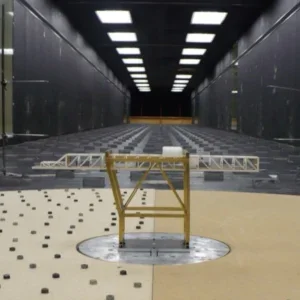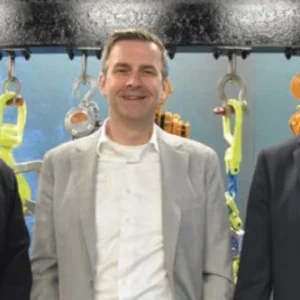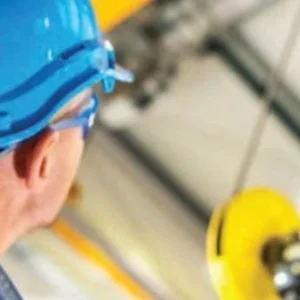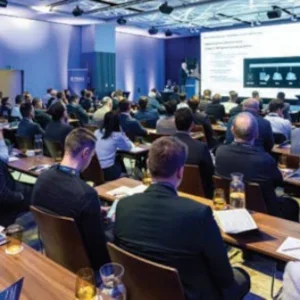US-based The Caldwell Group has partnered with distributors on the east and west coast of the country to deliver its Posi-Turner product to two heavy truck manufacturers in the past year.
The Posi-Turner is designed to rotate bulky and hard-to-handle objects through 360º in a controlled fashion during manufacture or assembly processes.
Caldwell says it is widely utilised throughout the automotive industry, and that the company works with various well known vehicle manufacturers.
In the case of one of the above truck manufacturers, the product combined with a chassis inversion system to lift heavy truck chassis weighing up to 30,000lbs.
Caldwell says the system encompasses the composite centre of mass, making the turnover process much more efficient.
The standard version of the Posi-Turner is targeted at anyone looking to make certain material handling processes more ergonomically efficient and safe and limit damage to the product. However, it is frequently customised or modified for specific end-use requirements. The optional Auto-Leveler, for example, is designed to keep a load level automatically while it is being rotated. It can be added to the Posi-Turner at the time of the order or be field-mounted to existing units.
It’s an addition that customers like, according to Sean Powers, Posi-Turner applications specialist at Caldwell, who says that the unit will “shut the rotation off until it levels itself… and then begin the rotation again”.
“Our customers like that because of the safety factor,” he explains. “There’s one less thing for the operator to have to be considering during the rotation.”
Speaking at the time of the truck deals earlier in the year, Patrick Eytalis, a recently retired application specialist at Caldwell, said: “A standard product is designed once and then manufactured in large quantities, often for a very long time. That type of product has its place – and Caldwell sells a lot of them – but the automotive industry presents different below-the-hook challenges that might be unique to a manufacturer or even a single production line. The Posi-Turner is a great product in its own right, but when customised to specific end-use requirements, it’s a game-changer.”
Powers says that since purchasing the product from a company called Park Industries at the start of the century, Caldwell has gone on to create its own designs for lots of different applications. In fact, Caldwell describes the industrial applications for the Posi-Turner as being “practically unlimited”, while Powers says there are so many variations – due to varying rotational speed or headroom requirements, for instance – that, actually, for the most part, “we don’t really have a standard unit. Every application that comes in is unique in some sense, and it’s all designed for that application.” Note that Powers says that industrial applications are “practically unlimited”.
He recalls when he first started working with the product with the older, more experienced Eytalis: “He was here 38 years and I worked with him for eight years, and when I first started doing the Posi-Turner he told me that we cannot rotate everything out there with it.
“Of course, being the younger, new guy, I was ‘OK, watch this’.
“[But] Pat was correct – we cannot rotate everything out there. But we can rotate a good majority of it.”
Powers says the Posi-Turner is a motorised unit that utilises chain, synthetic or steel mesh slings to lift and rotate an item “safely and efficiently”. For the most part, he continues, it enables a single person to carry out a rotating operation, using either a hand-held pendant or wireless remote control.
Before a product finds itself in the hands of an individual, however, there are plenty of safety and engineering considerations Caldwell has to take into account for each application, such as the product’s centre of gravity, the sling path, possible speed changes, perimeter travel, whether the product might list or corkscrew, and so on.
There are alternative products from different brands that do a similar job to the Posi-Turner – the Bushman, for instance – although Powers believes Caldwell’s use of, for example, different coatings in its product, makes it a “more effective” solution than others on the market.
TRANSPORT REPAIRS CASE STUDY
Transport Repairs provides truck and trailer parts and service support to the transport industry at seven sites across New Zealand. The kinds of tasks its staff carries out include moving cradles from logging trucks, changing radiators, lifting decks and changing tanks. But it could take hours for them to complete these tasks with their previous lifting method, which involved using a forklift with a sling. Tool solutions provider HTC specified a Reid Lifting Porta Gantry instead, which Transport Repairs has found to be a much faster and safer lifting system. Tasks that required multiple employees now only requires one person; for example, the Porta Gantry is able to straddle a truck deck as Well as take out a radiator from a flat face truck engine with comparative ease. The Porta Gantry suited Transport Repairs’ operational objectives as the company needed a transportable gantry for use across an entire workshop, avoiding the need for multiple fixed gantries and saving the firm a great expense. Using the Porta Gantry also saved Transport Repairs the time and money on the maintenance and compliance required with a fixed gantry.
HERIPRET OVERHEAD CRANE
French lifting equipment firm Heripret has installed a 40-ton overhead cranes at a metallurgy company looking to lift and turn a 35-ton mould, which would be used for stamping parts for the automotive industry.
“This project came about because [the company] needed to replace existing material already in place,” says Heripret president Daniel Maitrepierre. “It took nine months to complete in total and the challendes were the exceptional load capacity of 40 tons and the 34m span, because the customer needed motion precision for some specific tools under the crane. We overcame this using inverters for stepless speed on all motions (hoisting, travelling and crossing)”.
The 40-ton cranes and a 25-ton auxiliary trolley are fitted with customized Eurobloc VT 512 twin rail electric wire rope hoists. The trolley lifts the steel mould and auxiliary trolley tilts it. This turning upside down is necessary for the opening of the mould and its maintenance. The speed allowed by the hoist is very slow, ranging from 0.2m/minute to 5.1m/minute. A walkway on the crane provides easy and safe access to the tracvel motors and steering trolleys. It also allows rapid repairs and maintenance in complete safety.
The metallurgy company chose Heripret for the job that was completed in 2022 because the firm has fully maintained all of its lifting equipment since 2018.






